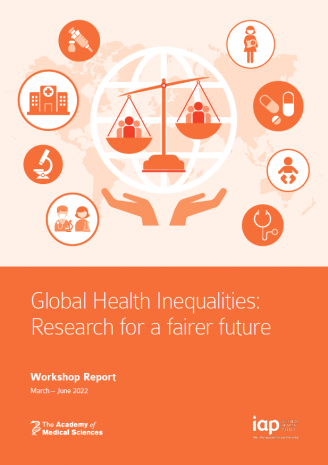The COVID-19 pandemic has had a particularly severe impact on disadvantaged and marginalised populations. Typically, they have experienced higher levels of SARS-CoV-2 infection, at least in the early stages of the pandemic, and worse health outcomes. They have also been more impacted by the indirect effects of the pandemic, such as reduced access to other health services and disrupted education.
These trends have been overlaid on existing health inequalities, with disadvantaged groups within countries already experiencing shorter life expectancies, a greater burden of ill-health and less access to quality health services. Reducing health inequalities will depend critically on the drive towards universal health coverage (UHC), embedded within Sustainable Development Goal 3.8, which seeks to ensure that all people, whatever their circumstances, have access to quality healthcare without facing the risk of financial impoverishment.
During March–June 2022, the UK Academy of Medical Sciences and the InterAcademy Partnership organised a series of workshops, at which participants from a broad range of countries shared their experience of the COVID-19 pandemic’s impact on health inequalities, with a specific focus on the role of Universal Health Coverage. The aim of the workshops was to identify priority areas for research into such inequalities as the world recovers from the acute phase of the pandemic.
Presentations and discussions at the workshops noted that different populations have been disproportionately affected by the COVID-19 pandemic in different ways. Typically, these have included ethnic minority populations, migrants and mobile populations, internally displaced people, and people who are socioeconomically disadvantaged or socially marginalised.
Furthermore, there have been multiple contributory factors underlying this selective vulnerability, affecting risk of exposure, access to services, take up of vaccination and underlying health risks. Most of these vulnerabilities are not specific to COVID-19 but reflect an increased risk of multiple poor
health outcomes. COVID-19 has shone light on, and often exacerbated, existing health inequalities affecting disadvantaged and marginalised communities.
These vulnerabilities typically reflect the impact of social determinants of health. Factors linked to socioeconomic disadvantage and unhealthy physical and social environments affect multiple aspects of disease exposure, risk of physical and mental health co-morbidities, and access to care. As countries recover from the acute phase of the pandemic, there are opportunities to learn the lessons from the response to the COVID-19 pandemic and leverage such learnings to accelerate the drive towards UHC and mitigate health inequalities. There is a need to better understand the nature and causes of health inequalities in different settings, to develop new interventions to address them, and to promote health emergency preparedness with an explicit focus on equity. The research community therefore has a critical role to play in generating the evidence to shape the path to recovery and a future where good health is more equally shared.
Although each country faces a unique combination of health inequality challenges, international comparisons and collaborations provide opportunities for sharing of experience and evidence, so countries can jointly address common challenges and evaluate potential solutions, sharing knowledge among themselves and with others. To facilitate this mutual exchange, workshop participants developed the following framework to guide an internationally coherent research response to health inequalities, as part of the drive towards UHC.


